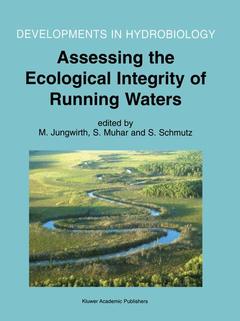Description
Assessing the Ecological Integrity of Running Waters, Reprinted from HYDROBIOLOGIA, 422/423, 2000
Proceedings of the International Conference, held in Vienna, Austria, 9-11 November 1998
Developments in Hydrobiology Series, Vol. 149
Coordinators: Jungwirth M., Muhar S., Schmutz S.
Language: English
Subjects for Assessing the Ecological Integrity of Running Waters:
Assessing the Ecological Integrity of Running Waters
Publication date: 10-2012
487 p. · 19.5x26 cm · Paperback
Publication date: 10-2012
487 p. · 19.5x26 cm · Paperback
Assessing the ecological integrity of running waters
Publication date: 06-2000
487 p. · 19.3x26 cm · Hardback
Publication date: 06-2000
487 p. · 19.3x26 cm · Hardback
Description
/li>Contents
/li>
The assessment of the ecological integrity of running waters is a prerequisite to an understanding of the effects of human alterations. The evaluation of degradation processes provides key information on how to avoid further negative impacts. The success of future conservation, mitigation and restoration activities will rely on sound assessment methodologies and their ecological relevance and applicability. Assessment methodologies are therefore an integral part of sustainable river management.
This book synthesizes and discusses state-of-the-art experiences in assessment methodologies. Including the latest knowledge on structures, processes and functions of running waters as a fundamental basis for developing adequate assessment methods, the book focuses on method development, application, and in particular on integrated assessment methods.
This book is directed at scientists and managers with the aim of more effective preservation, restoration and maintenance of the ecological integrity of running water ecosystems.
This book synthesizes and discusses state-of-the-art experiences in assessment methodologies. Including the latest knowledge on structures, processes and functions of running waters as a fundamental basis for developing adequate assessment methods, the book focuses on method development, application, and in particular on integrated assessment methods.
This book is directed at scientists and managers with the aim of more effective preservation, restoration and maintenance of the ecological integrity of running water ecosystems.
Preamble. Preface. Introduction. Basic Components of Running Waters - Processes and Functions. Abiotic Components. A Perspective on the Abiotic Processes Sustaining the Ecological Integrity of Running Waters; G.E. Petts. Restoring Ecological Integrity of Great Rivers: Historical Hydrographs Aid in Defining Reference Conditions for the Missouri River; D.L. Galat, R. Lipkin. The River Scaling Concept (RSC): a Basis for Ecological Assessments. Biotic Components. Biological Processes in Running Waters and their Implications for the Assessment of Ecological Integrity; S.E. Bunn, P.M. Davies. Mayflies (Insecta: Ephemeroptera) and the Assessment of Ecological Integrity - a Methodological Approach. Fundamentals of Fish Ecological Integrity and their Relation to the Extended Serial Discontinuity Concept; M. Jungwirth, et al. Indicators, Assessment Methods, and Applications. Assessing the Ecological Integrity of Rivers: Walking the Line among Ecological, Political and Administrative Interests; O. Moog, A. Chovanec. Indicators and Assessment Methods for Measuring the Ecological Integrity of Semi-Aquatic Terrestrial Environments; S.A. Innis, et al. Benthos. Towards the Assessment of `Ecological Integrity' in Running Waters of the United Kingdom; D.M. Harper, et al. The influence of Environmental Variables on the Abundance of Aquatic Insects - a Comparison of Ordination and Artificial Neural Networks; R. Wagner, et al. Biomonitoring through Biological Traits of Benthic Macroinvertebrates: How to Use Species Trait Databases? P. Usseglio-Polatera, et al. The Spatial Heterogeneity of a River Bottom: a Key Factor Determining Macroinvertebrate Communities; J.-N. Beisel, et al. River Ecotones: Carabid Beetles as a Tool for Quality Assessment; A. Boscaini, et al. Secondary Production of Benthic Communities at the Habitat Scale as a Tool to Assess Ecological Integrity in Mountain Streams; A. Buffagni, E. Comin. Performance of Different Biotic Indices and Sampling Methods in Assessing Water Quality in the Lowland Stretch of the Tiber River; A.G. Solimini, et al. Urbanization Gradients in Streams of Anchorage, Alaska: a Comparison of Multivariate and Multimetric Approaches to Classification; A.M. Milner, M.W. Oswood. Macroinvertebrate Functional Feeding Group Methods in Ecological Assessment; C. Rawer-Jost, et al. The Statistical Power of Selected Indicator Metrics using Macroinvertebrates for Assessing Acidification and Eutrophication of Running Waters; L. Sandin, R.K. Johnson. Evaluating Physical Habitat Integrity in Relation to the Biological Potential of Streams; C.F. Rabeni. Fish. Application of an Adapted Index of Biotic Integrity to Rivers of Lithuania; V. Kesminas, T. Virbickas. Fish as Indicators for the Assessment of the Ecological Integrity of Large Rivers; F. Schiemer. A Multi-Level Concept for Fish-Based, River-Type-Specific Assessment of Ecological Integrity; S. Schmutz, et al. Variation in a Great River Index of Biotic Integrity over a 20 Year Period; J.R. Gammon, T.P. Simon. Effects of Residual Flow and Habitat Fragmentation on Distribution and Movement of Bullhead (Cottus gobio L.) in an Alpine Stream; S. Fischer, H. Kummer. Habitat Condition and Fish Assemblage Structure in a Coastal Mediterranean Stream (Yarqon, Israel) Receiving Domestic Effluent; S. Gafny, et al. Benthic Invertebrate and Fish Communities as Indicators of Morphological Integrity in the Enz River (South-West Germany); W. Jansen, et al. Abiotic Indicators. Ide
© 2024 LAVOISIER S.A.S.
These books may interest you

Wetlands and Habitats 184.47 €



